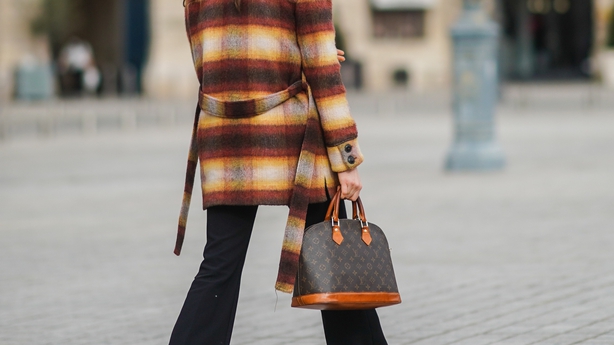LVMH's shares slumped today, knocking back other shares in the fashion sector, as the French luxury giant's third quarter revenues showed signs of a slowdown in growth.
LVMH's shares were down by around 6% in early trading this morning, dragging down the share prices of rivals such as Kering, Hermes, Swatch and Richemont.
LVMH's labels include Louis Vuitton, Dior and Tiffany.
It had reported a 9% rise in third quarter revenue last night, marking slower growth as a strong wave of post-pandemic spending eases due to inflation and economic turbulence.
"LVMH in our view remains among the names that should navigate this ongoing volatility relatively better; but with currently negative earnings momentum and uncertain outlook, we see limited scope for absolute re-rating in the short-term," wrote JP Morgan in a research note.
LVMH is facing slowing demand for high end goods in the US and Europe, where rising prices have prompted shoppers - especially younger generations - to pull back from a post-pandemic spending spree, while the recovery in China has been uneven.
The trend in Europe would impact the wider industry, JP Morgan forecast.
Shares in Gucci-owner Kering fell 3.2% at the market open while Hermes also shed more than 3%.
Investors have recently questioned the appetite for shares in the luxury goods sector, in the face of a Chinese slowdown and interest rate uncertainty.
Some $175 billion has been knocked off the value of 10 of Europe's leading luxury good stocks since the end of March, as China's recovery has been rocky and growth is slowing.
Meanwhile, while high inflation and rising interest rates are also forcing US shoppers to tighten their purse strings.
"After three roaring years, and outstanding years, growth is converging toward numbers that are more in line with historical average", LVMH chief financial officer Jean-Jacques Guiony told analysts.
LVMH said revenue came to €19.96 billion, up 9% year-on-year, stripping out the effect of currency fluctuations and acquisitions. Total revenue rose 1% year-on-year.

The fashion and leather goods division, home to Louis Vuitton and Dior, recorded sales growth of 9%, compared to analysts' expectations for 10% growth.
Guiony noted that while business slowed in Europe over the quarter, there was not a marked change in demand for fashion and leather goods from China compared to two years ago, except that more purchases are being made outside of the mainland as travel resumes.
In the US, there was little change in trends, according to Guiony.
The wines and spirits division posted a 14% revenue decline over the quarter, with the company flagging less demand for Champagne over the period, while the weak economic environment in the US, and a slower-than-expected bounce back in China affected demand for Hennessy cognac.
LVMH is the first major global luxury firm to report earnings this quarter and gives investors an insight into what to expect from rivals.
Hermes and Kering report on October 24.
"This seems good enough to support the share price, as buyside expectations were possibly more muted, as the significant market derating suggests," said Luca Solca, analyst with Bernstein, noting the company faced a tougher comparison period following strong performances in China, the US and Europe a year ago.
Investors have recently lowered their expectations for the luxury sector and around €96 billion has been knocked off the value of LVMH since April.
The French luxury group was last month unseated as Europe's most valuable listed company after a two and a half year long reign by Danish drugmaker Novo Nordisk, which was boosted by the growth of anti-obesity drug Wegovy.
A stronger euro against the US dollar than a year earlier also impacted the company as US sales were worth less when converted back into its home currency.
The negative currency impact was worse than anticipated, said Guiony, noting he expected it to negatively affect margins in the second half, although some of that would be offset by hedging strategies.
The currency impact is expected to affect European companies with large US operations this earnings season.

